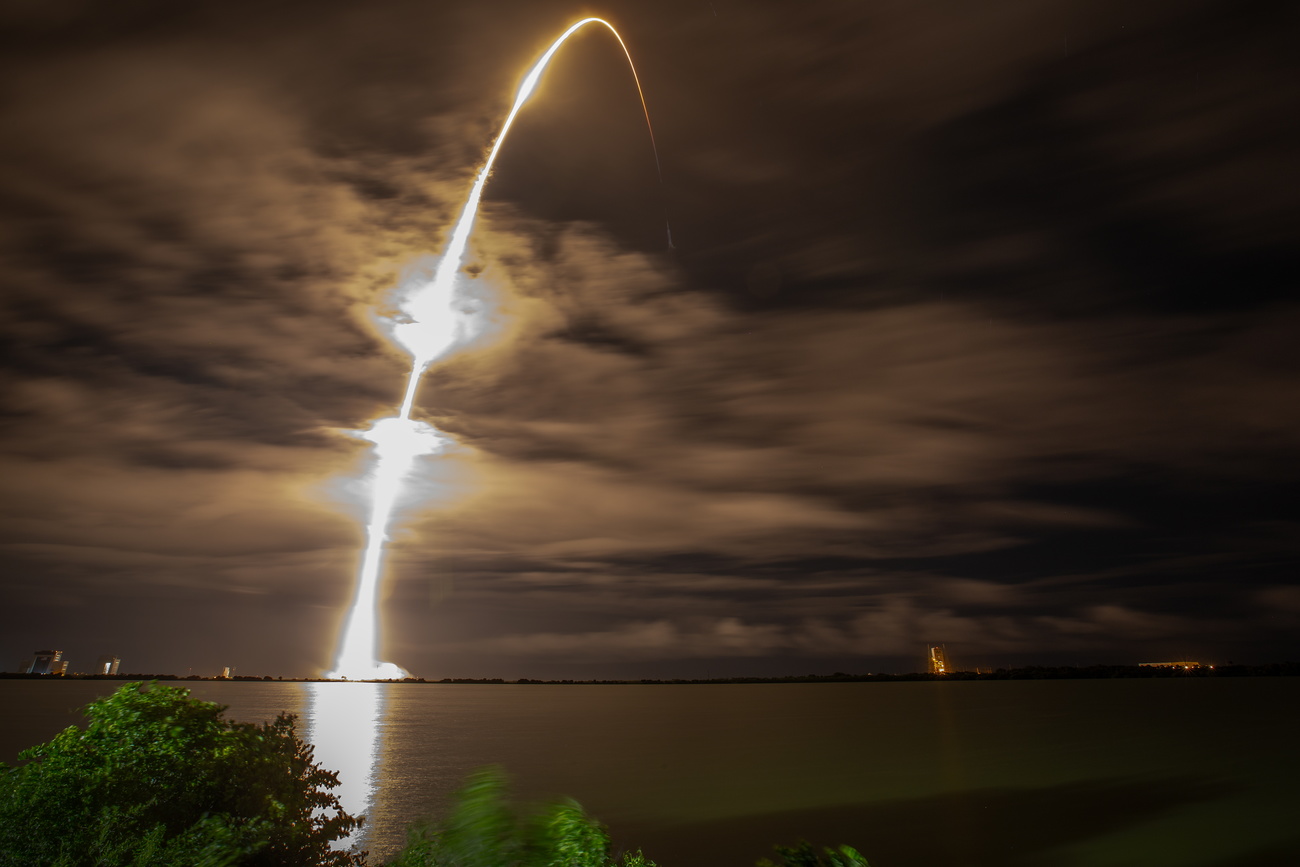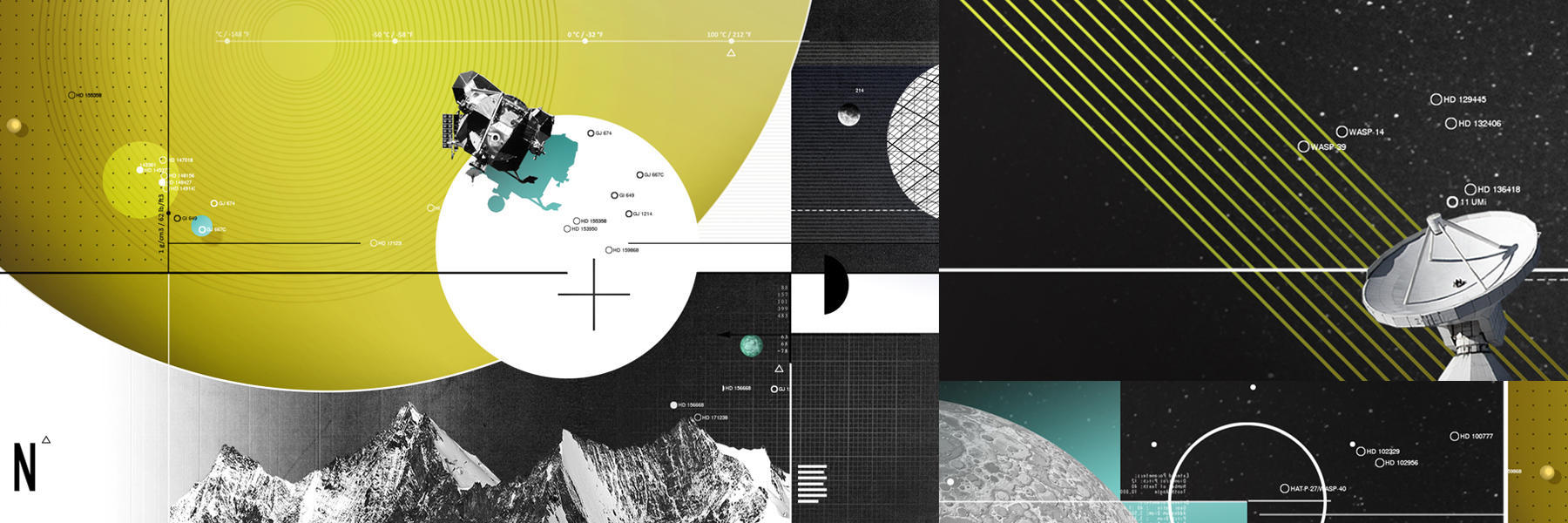Switzerland’s proposed law on space operations may not make headlines like the latest rocket launch, but its impact on how we collectively manage our activities beyond Earth’s atmosphere could prove just as significant in the long run.
When I first arrived in Switzerland in 2017, I knew little about the legacy and innovation of the Swiss space industry. While initially I had associated the country with mountains, chocolate and high salaries, I actually came because Switzerland produces the fairings (which protect the payload of a spacecraft) for the Ariane 5 and Ariane 6 launchers.
My perception changed quickly as I discovered a nation whose precision engineering and technical excellence had quietly established a remarkable presence in space exploration and science.
In early 2025, the Swiss parliament opened a public consultation for Switzerland’s first national space law.
Switzerland’s proposed law on space operationsExternal link may not make headlines like the latest rocket launch, but its impact on how we collectively manage our activities beyond Earth’s atmosphere could prove just as significant in the long run. This legislation is a pivotal development that deserves international attention. But why should people beyond Switzerland’s borders care about this?
More

More
Switzerland eyes mediation role amid rising risk of conflict in outer space
This content was published on
Apr 10, 2025
As political jockeying between the major powers intensifies in space, Switzerland wants to play the role of “bridge builder” to avert armed conflict in space.
Read more: Switzerland eyes mediation role amid rising risk of conflict in outer space
The global impact of Swiss space activities
We are all dependent on space technologies in our everyday lives. Navigation systems guide us through (un)familiar terrain. In Switzerland, Earth observation satellites provide data for MeteoSwiss, swisstopo and services like Google Earth, while communication satellites enable television broadcasts, data transfers, and internet connectivity through services like Starlink.
I quickly learned that Switzerland has established a remarkable presence in space exploration and science despite its modest size. The country provides the atomic clocks of the Galileo satellites. Swiss scientific contributions began with the Apollo missions, during which a Swiss solar experiment reached the lunar surface. As one of the ten founding members of the European Space Agency (ESA), Switzerland demonstrated an early commitment to cooperative space endeavours by ratifying all United Nations space treaties (with the exception of the Moon Agreement) between 1969 and 1978.

More
In space exploration, Switzerland punches above its weight
Nobel laureates, an exoplanet telescope, and instruments on board 50 space missions: In space, Switzerland is everywhere.
Read more: In space exploration, Switzerland punches above its weight
The ESA now has 23 member states. A large part of Switzerland’s space activity is carried out through participation in ESA programmes and missions in the context of education, research and innovation. Since 2008, Switzerland has participated in the UN Committee on the Peaceful Uses of Outer Space (COPUOS), contributing to global space governance discussions.
The Swiss flag has been carried into space by Claude Nicollier, a professor at the Federal Institute of Technology Lausanne (EPFL), and will soon be carried by Marco Sieber, who is part of the ESA’s newest astronaut cohort. Today, Switzerland is making an active contribution to the International Space Station (ISS), the future outpost Lunar Gateway and the ExoMars and Mars Sample Return missions.
A robust Swiss space sector
Switzerland’s evolution from component supplier to end-to-end space system provider is an example of how smaller nations can develop significant space capabilities.
Switzerland also has a robust space industry, with companies like APCO and Beyond Gravity leading a diverse ecosystem of innovative companies. Now a new generation of businesses will provide end-to-end solutions.This includes Astrocast (satellite IoT), Dphi Space, Clearspace (space debris removal), Wisesat, Aerospace Labs (ground segment operations), PAVE-Space, and Swissto12 (satellite components).
More

More
The world’s first space ‘garbage truck’ will be Swiss
This content was published on
Dec 5, 2020
It is the first time the European Space Agency (ESA) has allocated such a large sum (€86 million) to a start-up.
Read more: The world’s first space ‘garbage truck’ will be Swiss
These companies will operate under the proposed legal framework and represent Switzerland’s growing space ecosystem, showcasing the nation’s expanding capabilities in the sector.
This transformation is particularly relevant for other mid-sized nations looking to develop their space sectors without the massive budgets of space superpowers.
Strategic investments
As a liberal nation committed to innovation, Switzerland needs to make strategic investments in key space technologies to remain competitive globally, particularly given its position outside the European Union and the US tariffs that would apply to Swiss space goods. The concerning outflow of talented graduates seeking opportunities abroad and the increased demand for experienced engineers by local companies signal an urgent need to strengthen our domestic space industry. Recent investments by the Swiss Armed Forces in space-based infrastructure acknowledge this reality and represent a necessary adaptation to the increasingly tense geopolitical landscape.
The time to act decisively is now – Switzerland’s technological independence and future prosperity in the space sector depend on it.
While the Swiss space law provides a crucial legal framework, we must look beyond the regulation to secure Switzerland’s future in space.
As a French national observing this process, I find Switzerland’s approach particularly interesting. The consultation process itself demonstrates how a nation without a dedicated space agency can nonetheless develop comprehensive legislation to support a growing space sector. The outcome may offer valuable lessons for other nations with similar profiles. In addition, the bottom-up approach of the Swiss space policy is the right one to make new initiatives flourish.
Why the proposed Swiss law matters to everyone
With the proposed law on space operations, Switzerland will be able to implement three key aspects of international space governance that benefit global space activities:
UN registration: By creating a framework for operators to register their missions, Switzerland increases transparency in space operations – an essential step, as orbital traffic increases.
Liability convention: The law recognizes principles of international liability for space activities, establishing clear responsibility for potential damages.
Space sustainability: By including provisions for risk reduction and sustainable operations, Switzerland contributes to preserving space as a global common.
In short, the law maintains the attractiveness of Switzerland as a business location for public and private space operations and promotes the competitiveness of Swiss players in the field by providing a flexible framework that fosters innovation and minimises bureaucracy.
For Switzerland, it’s a chance to codify its space legacy and enable future growth. For the rest of us, it’s an opportunity to observe a thoughtful approach to one of our most pressing governance challenges – how to ensure that space remains accessible, useful, and sustainable for generations to come.
The proposed law on space operations will regulate the authorisation and supervision of space operations, clarify liability issues and create and maintain a national register of space objects. This consultation period, which ends May 6, invites stakeholders and interested parties to shape legislation that will govern Swiss activities beyond Earth’s atmosphere.
More

More
Our weekly newsletter on foreign affairs
Switzerland in a fast-moving world. Join us to follow the latest Swiss foreign policy developments. We offer the perfect immersive package.
Read more: Our weekly newsletter on foreign affairs
Edited by Benjamin von Wyl/gw
Articles in this story

